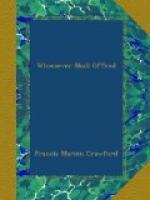“God made all the other animals before making women,” he observed contemptuously one day, when he had gone out alone with Marcello.
“I like them,” laughed the boy.
“So did Adam,” retorted Ercole, “and you see what came of it.”
No answer to this argument occurred to Marcello just then, so he said nothing; and he thought of Aurora, and his mother, and the sad-eyed Contessa, and wondered vaguely whether they were very unlike other women, as Ercole implied.
“When you know women,” the man vouchsafed to add presently, “you will wish you were dead. The Lord sent them into the world for an affliction and for the punishment of our sins.”
“You were never married, were you?” asked Marcello, still smiling.
Ercole stopped short in the sand, amongst the sea-thistles that grew there, and Nino trotted up and looked at him, to be ready if anything happened. Marcello knew the man’s queer ways, and waited for him to speak.
“Married?” he snorted. “Married? You have said it!”
This seemed enigmatical, but Marcello understood the words to convey an affirmation.
“Well?” he asked, expecting more.
“Well? Well, what?” growled Ercole. “This is a bad world. A man falls in love with a pretty little caterpillar; he wakes up and finds himself married to a butterfly. Oh, this is a very bad world!”
Marcello was struck by the simile, but he reflected that Aurora looked much more like a butterfly than a caterpillar, a fact which, if it meant anything, should signify that he knew the worst beforehand. Ercole declined to enter into any account of his conjugal experiences, and merely shrugged his shoulders and went on through the sand.
With such fitting and warning as this to keep him out of trouble, Marcello was to face life: with his saintly mother’s timid allusions to its wickedness, with Corbario’s tempting suggestions of harmless dissipation, with an unlettered peasant’s sour reflections on the world in general and women in particular.
In the other scale of the balance fate set his delicate and high-strung nature, his burning desire for the great unknown something, the stinging impatience of bodily weakness, and the large element of recklessness he inherited from his father, besides a fine admixture of latent boyish vanity for women to play upon, and all the ordinary weaknesses of human nature in about the same proportion as every one has them.
Given a large fortune and ordinary liberty, it might be foreseen that the boy would not reach the haven of maturity without meeting a storm, even if the outward circumstances of chance were all in his favour, even if no one had an interest in ruining him, even if Folco Corbario did not want all for himself, as poor Ercole told his dog that he did in the solitude of his hut.
Marcello had a bad chance at the start, and Maddalena dell’ Armi, who knew the world well in all its moods, and had suffered by it and sinned for it, and had shed many tears in secret before becoming what she was now, foresaw danger, and hoped that her daughter’s fate might not be bound up with that of her friend’s son, much as she herself liked the gentle-hearted boy. She wondered how long any one would call him gentle after he got his first taste of pleasure and pain.




